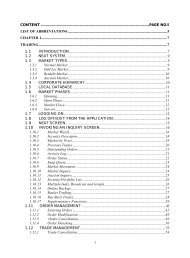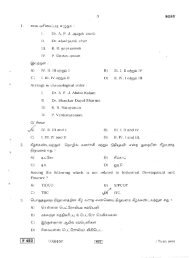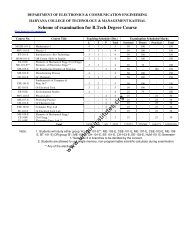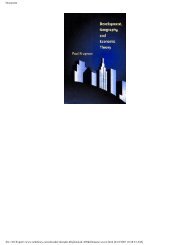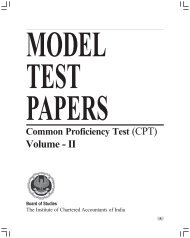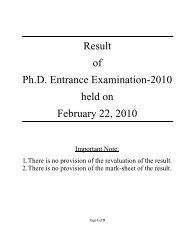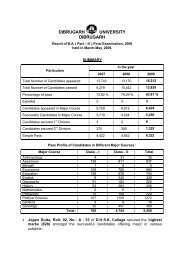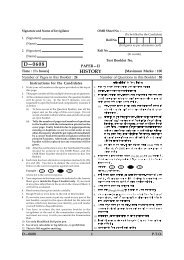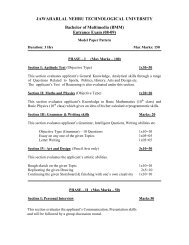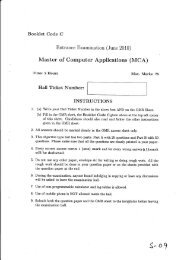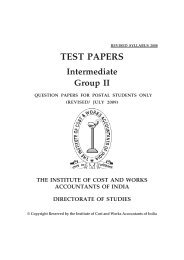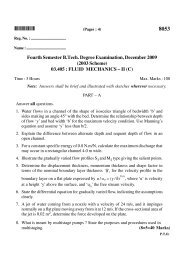- Page 1 and 2:
Lesson Outline � Nature of HRM
- Page 3 and 4:
Definition of HRM According to Flip
- Page 5 and 6:
Concept of HRM Human Resources are
- Page 7 and 8:
Taylor developed four principles of
- Page 9 and 10:
Systems Approach Era A system may b
- Page 11 and 12:
Relevance of HRM HRM is relevant in
- Page 13 and 14:
• Subscribe to the aims and objec
- Page 15 and 16:
• every opportunity for advanceme
- Page 17 and 18:
5. System approach - set of interde
- Page 19 and 20:
Introduction Organisation structure
- Page 21 and 22:
An organization structure should be
- Page 23 and 24:
2. Grouping of Activities Closely r
- Page 25 and 26:
operation. While line authority flo
- Page 27 and 28:
i. Divergent background Line and st
- Page 29 and 30:
Proto type dev. Dev = Development A
- Page 31 and 32:
Pure product Type Organization Here
- Page 33 and 34:
elationship. There is a need for un
- Page 35 and 36:
INTRODUCTION Modern business manage
- Page 37 and 38:
Features of HRM as a system The fol
- Page 39 and 40:
Industrial Relations Subsystems Mai
- Page 41 and 42:
Selection process � Short listing
- Page 43 and 44:
MERIT RATING b. Point comparison me
- Page 45 and 46:
Lay - Off i. Unsatisfactory perform
- Page 47 and 48:
Causes for Industrial Disputes Fina
- Page 49 and 50:
4. Job evaluation is the evaluation
- Page 51 and 52:
Introduction The primary objective
- Page 53 and 54:
Functions The functions performed b
- Page 55 and 56:
� Recruiting and selecting person
- Page 57 and 58:
Emerging HRM functions: Increasing
- Page 59 and 60:
7. PM emphasizes on economic reward
- Page 61 and 62:
1. Its objectives are manifold. The
- Page 63 and 64:
Introduction Environment comprises
- Page 65 and 66:
Political environment covers the im
- Page 67 and 68:
* Partnership - A joint business, w
- Page 69 and 70:
Employee’s State Insurance Act, 1
- Page 71 and 72:
Under this Act, on completion of 5
- Page 73 and 74:
Summary 3. Explain the role of Gove
- Page 75 and 76:
Introduction Though human resource
- Page 77 and 78:
According to Udai Pareek, “it is
- Page 79 and 80:
The following techniques are usuall
- Page 81 and 82:
outside. But in an existing organis
- Page 83 and 84:
HRP is not a static one-shot plan t
- Page 85 and 86:
Lesson Outline � Why HRIS? � HR
- Page 87 and 88:
STORING Same of the applications wh
- Page 89 and 90:
SELECTION OF PROJECT TEAM Once the
- Page 91 and 92:
Data storage and processing Benefit
- Page 93 and 94:
monitoring, vii) Performance apprai
- Page 95 and 96:
Introduction Recruitment, selection
- Page 97 and 98:
viz., Exchange (Compulsory Notifica
- Page 99 and 100:
establishments having 25 workers or
- Page 101 and 102:
) Strategy development c) Searching
- Page 103 and 104:
Selection process Following are the
- Page 105 and 106:
advice youth or job seekers regardi
- Page 107 and 108:
a) Deciding the objectives - The ob
- Page 109 and 110:
7. The interviewers should also evi
- Page 111 and 112:
Information induction In this syste
- Page 113 and 114:
LESSON 9 PERFORMANCE AND POTENTIAL
- Page 115 and 116:
organizations often use a combinati
- Page 117 and 118:
tempered. But the fact is fact. Eve
- Page 119 and 120:
i. The employee is hard working ii.
- Page 121 and 122:
The essay method is useful in provi
- Page 123 and 124:
v. Development of the BARS instrume
- Page 125 and 126:
Potential Appraisal Performance app
- Page 127 and 128:
Lesson Outline � Speciality of Vi
- Page 129 and 130:
� Customer orientation � Sharin
- Page 131 and 132:
� Adaptability. � Knowledge abo
- Page 133 and 134:
The characteristics of virtual orga
- Page 135 and 136:
g. To differentiate forms of intern
- Page 137 and 138:
3.5 Training and Development Method
- Page 139 and 140:
sensitivities and work more harmoni
- Page 141 and 142:
meet the growing needs of the indus
- Page 143 and 144:
organization. The mentor is usually
- Page 145 and 146:
uilding leadership, decision-making
- Page 147 and 148:
covered and learning processes invo
- Page 149 and 150:
positions occupied by a person duri
- Page 151 and 152:
3.15 Career Stages: There are four
- Page 153 and 154:
3.17 Promotions, Demotions and Tran
- Page 155 and 156:
merit and untainted by favoritism.
- Page 157 and 158:
employees may feel it uncomfortable
- Page 159 and 160:
3.20 Conditions Necessary for Empow
- Page 161 and 162:
enabling them to concentrate on mor
- Page 163 and 164:
etirement package before redesignin
- Page 165 and 166:
institutionalized the practice of w
- Page 167 and 168:
targeted for removal. To top it all
- Page 169 and 170:
12. Write a proposal for conducting
- Page 171 and 172:
2. R.W Mondy, R.M. Noe and S.R. Pre
- Page 173 and 174:
4.1 Introduction Human resource act
- Page 175 and 176:
* The base salary range for Project
- Page 177 and 178:
proper records. The system should c
- Page 179 and 180:
Once the jobs that are to be evalua
- Page 181 and 182:
is not paying above market rate and
- Page 183 and 184:
The problem of increasing productiv
- Page 185 and 186:
whether new jobs are getting added.
- Page 187 and 188:
what they are doing is a prerequisi
- Page 189 and 190:
ecoming) and self-fulfillment. Abra
- Page 191 and 192:
the odds are high because they get
- Page 193 and 194:
This theory proposes that an indivi
- Page 195 and 196:
atings he or she would receive. At
- Page 197 and 198: 6. Maintain positive health buffers
- Page 199 and 200: could be the causes of residual eff
- Page 201 and 202: Analyzing the conceptualizations of
- Page 203 and 204: the employees to meet the needs of
- Page 205 and 206: 3. Comment on the recent trend in o
- Page 207 and 208: 5. Motivation: The set of processes
- Page 209 and 210: MEANING AND DEFINITION UNIT V LESSO
- Page 211 and 212: • IR has moral dimensions, too. I
- Page 213 and 214: TRADE UNIONS Trade unions constitut
- Page 215 and 216: • DETAILED SUPERVISORY TRAINING T
- Page 217 and 218: ORIGIN • Trade unions are the cre
- Page 219 and 220: PRINCIPLES Trade unions function on
- Page 221 and 222: It is that rely upon the support of
- Page 223 and 224: they are important to carry on the
- Page 225 and 226: may in some cases, attempt reprisal
- Page 227 and 228: • Communication They keep members
- Page 229 and 230: • Disputes of Right, which relate
- Page 231 and 232: (iii) Grievance procedure COLLECTIV
- Page 233 and 234: • Mediation is a process by which
- Page 235 and 236: MEANING AND DEFINITION LESSON- IV C
- Page 237 and 238: Collective bargaining has benefits
- Page 239 and 240: • Administrative Issues NEGOTIATI
- Page 241 and 242: MEANING AND DEFINITION Lesson - V M
- Page 243 and 244: • Work-related pressures and trai
- Page 245 and 246: MC GREGOR’S RED HOT STOVE RULE On
- Page 247: Negative Feedback. In some organiza
- Page 251 and 252: MEANING AND DEFINITION LESSON - VI
- Page 253 and 254: • The Increased Use Of Technology
- Page 255 and 256: IMPORTANCE OF PARTICIPATION • The
- Page 257 and 258: • The management and the workers




